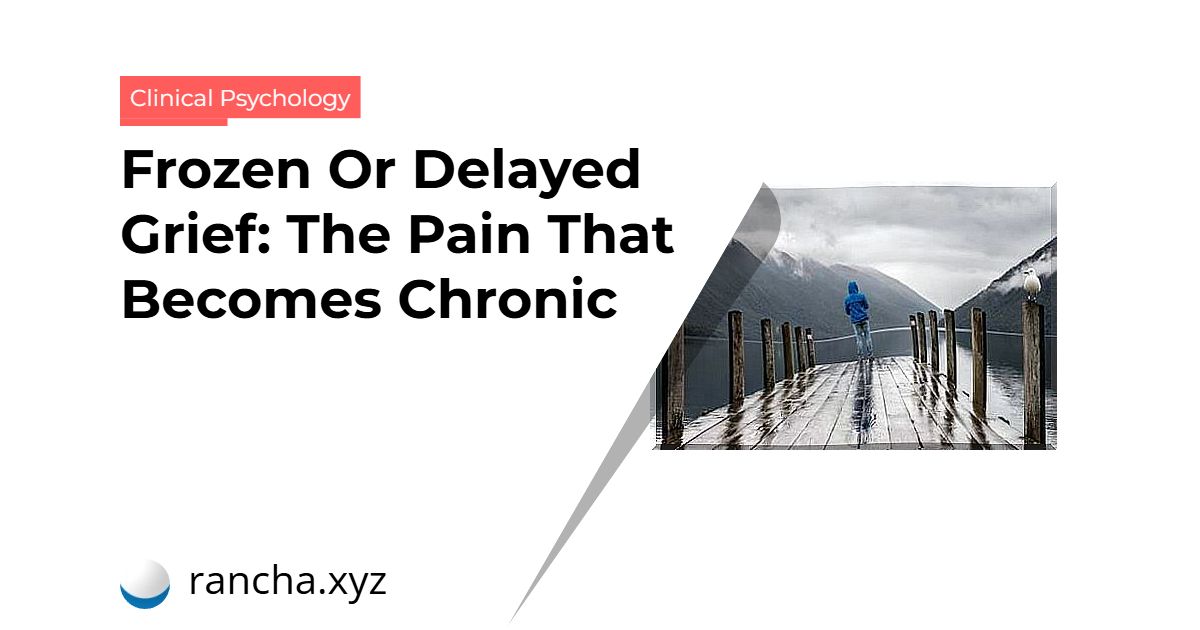Frozen grief refers to an unresolved loss. It is pain that becomes chronic, that lingers permanently and that manifests itself in many different ways: anxiety, stress, exhaustion, apathy, constant irritation…
So, as impressive as it may seem, we are facing a clinical reality that occurs very often.
There are people who don’t quite know what to do with this set of adverse sensations. It is difficult to deal with this suffering that paralyzes them and puts them in a vacuum that is very difficult to manage.
Others cling to their daily lives, their work and obligations trying to convince themselves that they can move on. They tell themselves that nothing happened, that the pain can be hidden, like someone keeping a personal object in a safe.
In both cases, the same anatomy of suffering appears: that of pathological grief, one in which there is no closure or acceptance of the loss. So if there’s one thing we should understand it’s that pain has no expiration date.
It can last for decades and integrate into everything we think and do. However, frozen grief masks itself in various illnesses and completely obscures the chance of being happy again.

What is frozen grief?
The pain can freeze, hang, or even get stuck like a seed in a drop of amber. This happens when we refuse to face a painful reality, when we say it’s better to put it aside and go back to our lives, avoiding thinking about the person we’ve just lost.
If there is one thing that mourning experts know very well, it is that this psychological process is experienced very differently by each of us.
Now, the general view on the subject is that a loss is synonymous with sadness and that, on average, it takes us between a year and a year and a half to face and accept grief.
These ideas are not entirely correct. For starters, when we lose someone we experience more than sadness. In addition, there is anger, confusion and even anguish.
Likewise, the experience of mourning is directly related to each person’s personality, the resources they have and the social and personal support they have.
So, as explained in a study by Dr. Katherine Shear of Columbia University, New York, it is very difficult to predict how each person will cope with the loss of a loved one.
In addition, it is estimated that around 5% of the population will experience frozen or delayed grief at some point in their lives. The characteristics of this process would be as follows:
most common symptoms
Frozen or delayed grief appears as a defense mechanism. The person refuses to accept the reality of what happened, cannot face it and feels unable to deal with such suffering.
Thus, the brain chooses to deny or simply “freeze” the suffering leaving it for another time.
All this psychological effort and emotional containment have consequences:
- It is common to suffer from anxiety and stress disorders.
- The person suffers from hypersensitivity. Any unforeseen or fortuitous event is lived in an oversized way.
- It can lead to eating disorders or addictive behaviors.
- There is a clear refusal to talk about the loss of the significant other.
- Psychosomatic symptoms appear such as digestive problems, allergies, headaches, muscle pain, skin problems, hair loss.
- Lack of vision or future planning. In this way, the person stops making plans and has no life goals.
- Relationship problems arise: lack of joy, patience, desire to share, enjoy leisure time… Moreover, sometimes you even fail to connect with others in an authentic way. Empathy is lacking because inner suffering obscures almost everything.
How to treat frozen or delayed grief
The person living with frozen grief must know that, at some point, all this emotional charge will eventually emerge. However, a sudden trigger is often enough to mix different sensations capable of overflowing us.
Thus, the death of a pet, seeing someone sick or even suffering a minor setback, triggers a flood of feelings that we don’t know how to manage.
In the Diagnostic and Statistical Manual of Mental Disorders (DSM-5), the clinical condition of frozen mourning does not appear as such. However, it does include diagnostic criteria for “persistent complex grief disorder”.
Now, knowing that this type of pathological grief exists, in recent years new therapies have been developed that have proven to be very effective in dealing with it.
An example of this was presented in a 2012 study conducted by Dr. Julie Wetherell of the University of San Diego, California. It is an approach that combines cognitive-behavioral therapy and interpersonal therapy with prolonged exposure techniques.
The basic objective is to facilitate the acceptance of the loss, work on emotions and an aspect that usually appears in many cases: the feeling of guilt.

To conclude, facing a loss is something that no one is prepared for. Grief is not a universal or normative process, it is dynamic, hard, complex and even pathological in many cases.
However, being able to ask for help will allow you to face this reality in a more adjusted and healthy way.
 rancha.xyz Be free to choose their own route to self-knowledge, health and balance of body and soul.
rancha.xyz Be free to choose their own route to self-knowledge, health and balance of body and soul.




